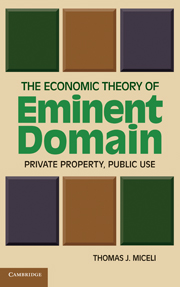4 - Land Use Incentives
Published online by Cambridge University Press: 05 June 2012
Summary
I look forward to a time when the part played by history in the explanation of dogma shall be very small, and instead of ingenious research we shall spend our energy on a study of the ends sought to be attained and the reasons for desiring them. As a step towards that ideal it seems to me that every lawyer ought to seek an understanding of economics.
Oliver Wendell Holmes, Jr., “The Path of the Law” (1897, p. 474)The preceding chapter focused on various aspects of the just compensation requirement, including its impact on fairness, its insurance function, and its role in creating proper government incentives. Recent economic literature on takings, however, has highlighted a different aspect of compensation, namely its impact on the investment incentives of landowners who face the risk of a taking. This line of research began with the seminal paper by Blume, Rubinfeld, and Shapiro (1984) (hereafter, BRS), which showed that compensation for takings creates a potential moral hazard problem that causes landowners to overinvest in land that is potentially suitable for a taking. The most famous (or rather, infamous) implication of this research was the so-called no-compensation result, which demonstrated that zero compensation is consistent with efficient investment incentives.
The BRS analysis was actually more subtle than this conclusion suggests, but the no-compensation result has nevertheless provided a convenient straw man for stimulating subsequent research, much of it aimed at providing countervailing arguments.
- Type
- Chapter
- Information
- The Economic Theory of Eminent DomainPrivate Property, Public Use, pp. 85 - 112Publisher: Cambridge University PressPrint publication year: 2011



